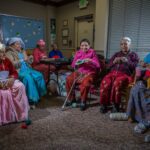Asylum seekers and refugees frequently suffer from post-traumatic stress and culturally sensitive methods towards reducing symptoms should be taken into account. The aim of the work reported was to examine the effectiveness of Culture-Sensitive and Resource Oriented Peer (CROP) Groups for Chechen asylum seekers and refugees towards reducing post-traumatic symptoms, anxiety, and depression. Some 94 participants were randomly assigned to 15 sessions of CROP or Cognitive Behavior Therapy (CBT) Groups, to 3 single sessions of Eye Movement Desensitization and Reprocessing (EMDR), or to a Wait-List (WL). The results indicated that CROP was significantly superior to WL, and was equally effective as CBT in reducing post-traumatic symptoms, anxiety, and depression. Improvements still were present at three and six month follow-up occasions. EMDR yielded negative results. According to this pilot study, CROP-Groups pose a promising, culturally sensitive alternative to psychotherapy with Chechen migrants.
Bystanders of ethnic victimization: Do classroom context and teachers’ approach matter for how adolescents intend to act?
The study examined how adolescents’ individual characteristics and class context are related to bystander behaviors in cases of ethnic victimization. The sample included 1065 adolescents

